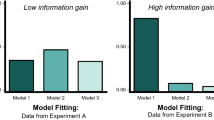Abstract
In the Arthur-Lane information contagion model, agents choose sequentially between two competing products, basing their decisions upon information obtained from a sample of previous adopters. The market shares that each product obtains depend upon the true difference in performance between the products, but also on the number of previous adopters each agent samples and the way in which agents use the sample information to guide their product choice.
If an agent in the information contagion world were to consult a statistician, he would surely be advised to sample more previous adopters rather than less (assuming observations are costless) and to base his decision rule on the value of sufficient statistics for the products’s unobservable performance characteristics. Bayesian statisticians might also recommend that the agent choose the product that maximizes his expected utility.
Surprisingly, these recommendations can lead to undesirable effects at the social level. First, giving individual agents access to more information can lead to smaller market share for the superior product. Second, a simple rule-of-thumb based on insufficient statistics always leads to an asymptotic market share of 100% for the better product. No rule based on sufficient statistics enjoys this property. In particular, Bayesian optimization can result in substantial market share for the inferior product.
Access this chapter
Tax calculation will be finalised at checkout
Purchases are for personal use only
Preview
Unable to display preview. Download preview PDF.
Similar content being viewed by others
References
Arthur, W. B. (1995). “Complexity in economic and financial markets.” Complexity1, 20–25
Arthur, W.B. and D.A. Lane (1993). “Information contagion.” Economic Dynamics and Structural Change4, 81–104
Bassan, B. and M. Scarsini (1995). “On the value of information in multi-agent decision theory.” Journal of Mathematical Economics24, 557–576
Ellison, G. and D. Fudenberg (1995). Word of mouth communication and social learning. Quarterly Journal of Economics110, 93–126
Hill, B. M., D. A. Lane, and W. D. Sudderth (1980). “A strong law for some generalized urn processes.” Annals of Probability8, 214–226
Hutchins, E. (1995). Cognition in the Wild. Cambridge: MIT Press
Langer, E. J. (1975). The illusion of control. Journal of Personality and Social Psychology32, 311–328
Warglien, M, and A Narduzzo (1996). “Learning by the experience of others, an experiment on information contagion.” To appear Industrial and Corporate Change
Author information
Authors and Affiliations
Editor information
Editors and Affiliations
Rights and permissions
Copyright information
© 1996 Springer Science+Business Media New York
About this chapter
Cite this chapter
Lane, D. (1996). Individual Rationality and Social Efficiency in an Information Contagion Model. In: Lee, J.C., Johnson, W.O., Zellner, A. (eds) Modelling and Prediction Honoring Seymour Geisser. Springer, New York, NY. https://doi.org/10.1007/978-1-4612-2414-3_3
Download citation
DOI: https://doi.org/10.1007/978-1-4612-2414-3_3
Publisher Name: Springer, New York, NY
Print ISBN: 978-1-4612-7529-9
Online ISBN: 978-1-4612-2414-3
eBook Packages: Springer Book Archive




